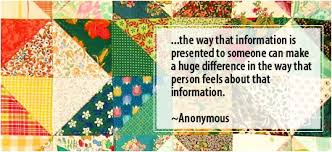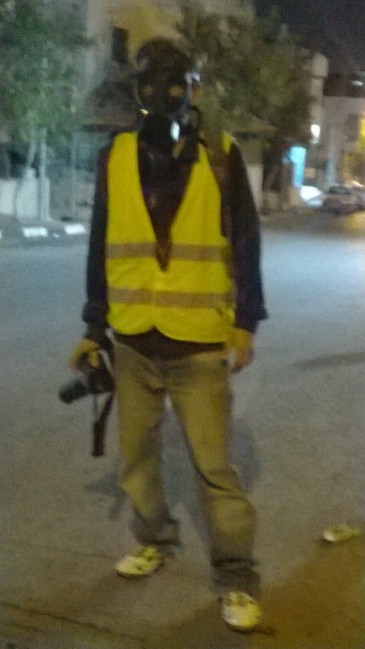This blog is written by CADFA volunteers based in Abu Dis. For more about CADFA see CADFA.org or our Facebook page @camdenabudis The posts are by the volunteers and do not necessarily represent the views of CADFA
Wednesday 17 December 2014
Left to Fight
My reality has been clearly defined and colonised
By broken promises and lies constructed to imprison my mind.
These lies then thickened into walls over time
They’re more imposing and restrictive than any border line.
Why should another nation decide the future of my plight
Each time a person dies, it seems like there’s no end in sight.
As deaths continue to rise, I lose parts of my mind
Confusion, with no solution, my only choice is to fight.
Prayer is our form of hope, we yearn for change in this life
We dream of justice, of peace, far from pain and strife.
Freedom is an illusion, it’s the start of the lies
That shields the truth from my heart and my eyes.
We vote for new leaders, but division remains
It’s like there’s two occupations, two sets of chains.
Resistance will remain until we see change
Never will you see the day that our defiance breaks.
From the West Bank to the Gaza Strip
Bombs rain down on the dreams of innocent kids.
Israel claims it’s “legitimate” violence
Whilst the media is fixed on impotent silence.
Maybe violence is the only option
When your tongue is taken with your conscience.
Talk of terrorism is blatant nonsense
Ask yourself - what makes a real monster?
Is it stones and keffiyehs?
Or drones that bring tears?
Feeling alone with this fear
I’ve lived with empty promises for years.
These rocks reflect my courage, they’re a part of me
No tear gas will ever suffocate the heart of me.
Violence may not be the answer, we need unity
But can you blame me when I have no opportunities.
As the media fabricates an inaccurate guise
It’s harder for our dreams to actualise.
When a child has no family, no hope, no home
A gun is his reassurance that he can cope on his own.
Go and read some history, before you start your debates
Learn about Balfour, the British, 1948.
I’ve seen gunshots tear through the hearts of my friends
I’ve seen blood, I’ve seen bodies, I’ve seen mothers lament.
When you boycott and divest, you’re lifting the chains off our shoulders
And when you film and tweet you expose the crimes of soldiers.
Alone we are nothing, but together we can progress
We can collaborate to end this man-made mess.
Consciousness creates power and power produces passion
Passion creates compassion and will naturally lead to action.
So next time you flick on the news, spare a thought for me
And together we will see the day that my land and people are free.
Max Slaughter
Monday 8 December 2014
The ID System
Classification
The Israeli authority has created an identification system by which it controls where people can live, access services and participate in politics. The categories and populations, according to Visualizing Palestine, include:
Jewish Israeli citizens (5.9m): Free to live throughout Israel and in 60% of occupied West Bank. Can vote in Israeli parliament.
Palestinian Israeli citizens (1.3m): Barred from living in 68% of all towns in Israel. Can vote in Israeli parliament.
East Jerusalem Palestinians (0.3m) holding blue ID: Free to travel between East Jerusalem and the West Bank, but are not citizens of Israel and as not living in an occupied territory, are not citizens of Palestine either. Therefore they are given Jordanian citizenship. Applications and renewals of Jordanian passports take place in Jordan, which is expensive to get to. People with blue ID cards are not allowed to leave Israel from Tel Aviv and must travel via Jordan. Cannot vote in Israeli parliament.
West Bank Palestinians (2.3m) holding green ID: Barred from living anywhere but 40% of West Bank. Can’t go to East Jerusalem without permission. Permission categories include medical, work, study and to visit family. Permission is only granted for specific days and spending the night in East Jerusalem is forbidden on all accounts, except medical. Palestinians in the West Bank can apply for a Palestinian passport which can be renewed in Ramallah. They can only leave the country via Jordan. Cannot vote in Israeli parliament.
Gaza Strip Palestinians (1.6m): Barred from living outside Gaza since 2007. Cannot vote in Israeli parliament.
Exiled Palestinians (5.7m): Barred from returning to Israel or occupied Palestine. Cannot vote in Israeli parliament.
Background
In 1949 the Armistice Agreement between Israel and the surrounding Arab countries, monitored by the United Nations, resulted in the Green Line which divided Jerusalem into the west and east. West Jerusalem became part of Israel and East Jerusalem, including the Old City, was part of the Jordanian-held West Bank.

In 1967 Israel declared war on its neighbouring Arab countries and annexed the Old City in East Jerusalem. Palestinians living in this area were given blue ID papers and those living in the occupied territory of the West Bank were given green ID papers. Check points were set up between these areas, but people were still able to travel between them.
 In 2003 the Israeli authority constructed a wall separating East
Jerusalem from the West Bank and implemented the current system by which
Palestinians have to apply for written permission to cross into the
East Jerusalem area.
In 2003 the Israeli authority constructed a wall separating East
Jerusalem from the West Bank and implemented the current system by which
Palestinians have to apply for written permission to cross into the
East Jerusalem area.
Applying for Permission
The process can take up to two weeks and is given for one of the following reasons only: 1) health 2) study 3) work 4) to visit family. The permission will be given for specific days and times and is not granted for overnight stays. Being allowed to cross the border for health reasons is not straight forward, often leading to emergency situations, and getting permission to visit family is rare – usually only granted on holidays. Many people are denied permission without reason, especially young men.

Abu Dis
Before the separation wall was built, East Jerusalem encompassed surrounding villages including Abu Dis, 4km away from the Old City. Although technically people here held different coloured ID papers from people closer to the holy sites, Abu Dis was in reality still an extension of the city. Most people living in Abu Dis went to school or worked in Jerusalem. The residents of Abu Dis were born in the hospitals there and Jerusalem University (University Al’Quds) is situated in Abu Dis.
In 2003 the separation wall was built, cutting through the village and dividing its people. Suddenly being identified as ‘blue’ or ‘green’ had significant consequences. Those with green IDs could no longer travel to Jerusalem. Thousands lost their jobs, children were moved to the over crowded schools in Abu Dis and many were unable to visit family members who had blue IDs. In some roads in Abu Dis, the houses on the left fall under East Jerusalem and the residents have blue IDs and the houses on the right are in the West Bank, with green IDs. Half the street can travel to Jerusalem to access services there, and half cannot. The East Jerusalem houses are double the price of the West Bank ones.
The residents with green ID papers who have been cut off from Jerusalem, have not been affiliated with a new place, leaving them without a city. This was highlighted in the symbolic action called the ‘Jerusalem Marathon’ which took place on Saturday. The race was in fact 2km, from the wall on the eastern edge of Abu Dis to the wall on the west. Over 1000 runners took part to demonstrate their sense of being trapped. The event was followed by speeches and national food, music and dance in defiant celebration of Palestinian culture. There is a full marathon that takes place in Palestine, organised by a group called The Right to Movement. The route is two laps of a 21.km loop as there is nowhere in the West Bank where a full marathon route can be marked out without having to go through a military checkpoint.
Runners at the Abu Dis ‘Jerusalem Marathon’
‘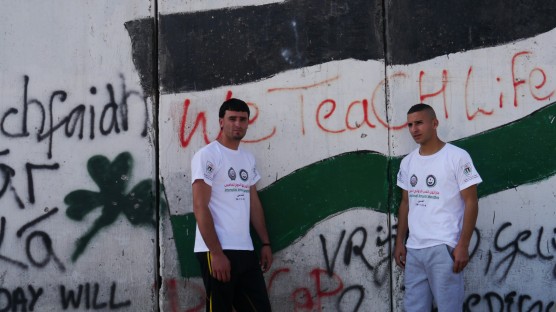
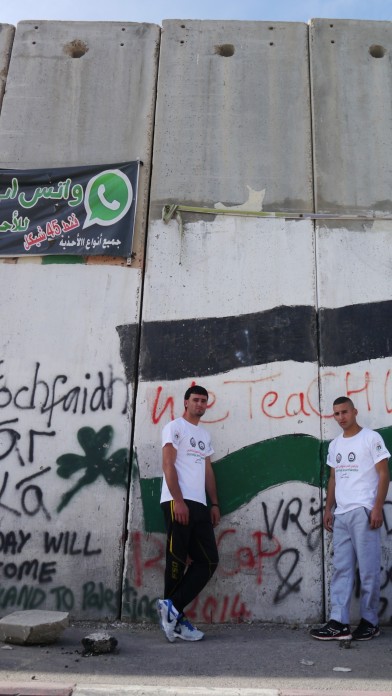
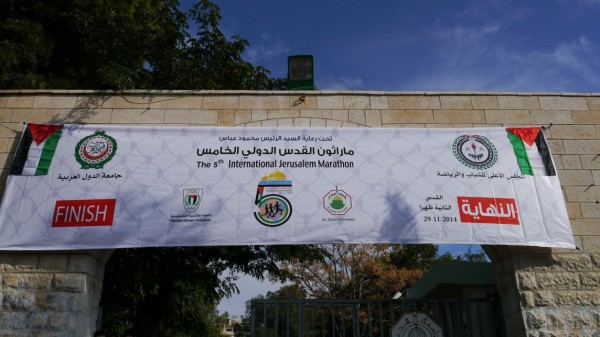
The Israeli authority has created an identification system by which it controls where people can live, access services and participate in politics. The categories and populations, according to Visualizing Palestine, include:
Jewish Israeli citizens (5.9m): Free to live throughout Israel and in 60% of occupied West Bank. Can vote in Israeli parliament.
Palestinian Israeli citizens (1.3m): Barred from living in 68% of all towns in Israel. Can vote in Israeli parliament.
East Jerusalem Palestinians (0.3m) holding blue ID: Free to travel between East Jerusalem and the West Bank, but are not citizens of Israel and as not living in an occupied territory, are not citizens of Palestine either. Therefore they are given Jordanian citizenship. Applications and renewals of Jordanian passports take place in Jordan, which is expensive to get to. People with blue ID cards are not allowed to leave Israel from Tel Aviv and must travel via Jordan. Cannot vote in Israeli parliament.
West Bank Palestinians (2.3m) holding green ID: Barred from living anywhere but 40% of West Bank. Can’t go to East Jerusalem without permission. Permission categories include medical, work, study and to visit family. Permission is only granted for specific days and spending the night in East Jerusalem is forbidden on all accounts, except medical. Palestinians in the West Bank can apply for a Palestinian passport which can be renewed in Ramallah. They can only leave the country via Jordan. Cannot vote in Israeli parliament.
Gaza Strip Palestinians (1.6m): Barred from living outside Gaza since 2007. Cannot vote in Israeli parliament.
Exiled Palestinians (5.7m): Barred from returning to Israel or occupied Palestine. Cannot vote in Israeli parliament.
Background
In 1949 the Armistice Agreement between Israel and the surrounding Arab countries, monitored by the United Nations, resulted in the Green Line which divided Jerusalem into the west and east. West Jerusalem became part of Israel and East Jerusalem, including the Old City, was part of the Jordanian-held West Bank.

In 1967 Israel declared war on its neighbouring Arab countries and annexed the Old City in East Jerusalem. Palestinians living in this area were given blue ID papers and those living in the occupied territory of the West Bank were given green ID papers. Check points were set up between these areas, but people were still able to travel between them.

Applying for Permission
The process can take up to two weeks and is given for one of the following reasons only: 1) health 2) study 3) work 4) to visit family. The permission will be given for specific days and times and is not granted for overnight stays. Being allowed to cross the border for health reasons is not straight forward, often leading to emergency situations, and getting permission to visit family is rare – usually only granted on holidays. Many people are denied permission without reason, especially young men.

Abu Dis
Before the separation wall was built, East Jerusalem encompassed surrounding villages including Abu Dis, 4km away from the Old City. Although technically people here held different coloured ID papers from people closer to the holy sites, Abu Dis was in reality still an extension of the city. Most people living in Abu Dis went to school or worked in Jerusalem. The residents of Abu Dis were born in the hospitals there and Jerusalem University (University Al’Quds) is situated in Abu Dis.
In 2003 the separation wall was built, cutting through the village and dividing its people. Suddenly being identified as ‘blue’ or ‘green’ had significant consequences. Those with green IDs could no longer travel to Jerusalem. Thousands lost their jobs, children were moved to the over crowded schools in Abu Dis and many were unable to visit family members who had blue IDs. In some roads in Abu Dis, the houses on the left fall under East Jerusalem and the residents have blue IDs and the houses on the right are in the West Bank, with green IDs. Half the street can travel to Jerusalem to access services there, and half cannot. The East Jerusalem houses are double the price of the West Bank ones.
The residents with green ID papers who have been cut off from Jerusalem, have not been affiliated with a new place, leaving them without a city. This was highlighted in the symbolic action called the ‘Jerusalem Marathon’ which took place on Saturday. The race was in fact 2km, from the wall on the eastern edge of Abu Dis to the wall on the west. Over 1000 runners took part to demonstrate their sense of being trapped. The event was followed by speeches and national food, music and dance in defiant celebration of Palestinian culture. There is a full marathon that takes place in Palestine, organised by a group called The Right to Movement. The route is two laps of a 21.km loop as there is nowhere in the West Bank where a full marathon route can be marked out without having to go through a military checkpoint.
Runners at the Abu Dis ‘Jerusalem Marathon’
‘



Friday 21 November 2014
Igniting tinder
Palestinian Kills Israeli With Car, Attacks Crowd
Obama Condemns Jerusalem Attack
East J’lem bus driver found hanged, autopsy confirms suicide suspicion
Jerusalem synagogue: Palestinians kill Israeli worshippers
Clashes as Israeli police make arrests in east Jerusalem
Over the last week the attacks in Palestine/Israel have been reported in worldwide news but maybe not as they should have. How many people have heard about the attacks on the synagogue or how Israeli troops fight to calm down the riots or imprison the ‘terrorists.’ More than I’m guessing have heard of Yusuf Hassan and the police reports. I’m not talking about the official report of his ‘suicide,’ but everything else.
Reports say that he was found at the bus station after hanging himself. He was taken to hospital and later the autopsy showed it was a suicide. Simple right? Now the synagogue has been attacked by Palestinians and people were killed. Fight, death, riots, no wonder the army is being called in to take drastic action. Well that’s bullshit! I have spend too many years listening to what someone tells me and letting them shape the way I think. Not now. I’m here, I can see for myself whats’s happening.
Yusuf Hassan, 32, a father of two, was hanged and 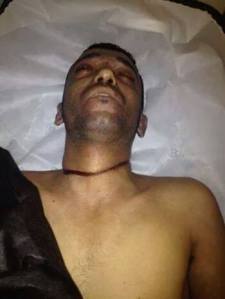 murdered by Israelis in a nationalistically motivated crime. He was from Abu Dis, living in Jerusalem as an Israeli bus driver, the next he was dead. His body was taken to an Israeli hospital and his family was told he committed suicide. When they were allowed to see his body they knew that it was a lie. Bruising smothered his face and the thin line that rounded his neck was not of any kind of rope but thin enough to look like metal wiring. This just didn’t make any sense so they requested his body be moved to a Palestinian hospital to have an autopsy. This was denied.
murdered by Israelis in a nationalistically motivated crime. He was from Abu Dis, living in Jerusalem as an Israeli bus driver, the next he was dead. His body was taken to an Israeli hospital and his family was told he committed suicide. When they were allowed to see his body they knew that it was a lie. Bruising smothered his face and the thin line that rounded his neck was not of any kind of rope but thin enough to look like metal wiring. This just didn’t make any sense so they requested his body be moved to a Palestinian hospital to have an autopsy. This was denied.
 murdered by Israelis in a nationalistically motivated crime. He was from Abu Dis, living in Jerusalem as an Israeli bus driver, the next he was dead. His body was taken to an Israeli hospital and his family was told he committed suicide. When they were allowed to see his body they knew that it was a lie. Bruising smothered his face and the thin line that rounded his neck was not of any kind of rope but thin enough to look like metal wiring. This just didn’t make any sense so they requested his body be moved to a Palestinian hospital to have an autopsy. This was denied.
murdered by Israelis in a nationalistically motivated crime. He was from Abu Dis, living in Jerusalem as an Israeli bus driver, the next he was dead. His body was taken to an Israeli hospital and his family was told he committed suicide. When they were allowed to see his body they knew that it was a lie. Bruising smothered his face and the thin line that rounded his neck was not of any kind of rope but thin enough to look like metal wiring. This just didn’t make any sense so they requested his body be moved to a Palestinian hospital to have an autopsy. This was denied.
Next are the unfortunate ‘coincidences.’ I understand that Israeli buses have three cameras on them which should have captured Yusuf before he died. The cameras weren’t working. He was also found at the station so what about those cameras. Again, its a terrible shame that they too were not working. So what did they find? A dead Palestinian who they took to the hospital and decided on suicide…….. Please don’t be blind and decide for yourself what you think now that you can see there has been so much more that has been told.
Justice is not here. It hasn’t been for a long time.
Yusuf was the tinder used to ignite kindling as people start to fight back. Now the people gather in multitude pushes and the Israelis have an excuse to justify what they do. You may not see it, but war suits some people and sometimes by lighting a match, they are actually starting something bigger.
Do not forget Yusuf Hassan but don’t let his life be brushed aside. Don’t let his family live with the lies in the world. We deserve more.
Saturday 15 November 2014
The gentle stranger.....
Full tourist mode ahead. Arriving in Jerusalem today, I wanted to site see and visit all the Christian spots. I myself have been brought up as a Catholic Christian but have always had free reign to make my own decisions about faith. I’m not a strong believer in any 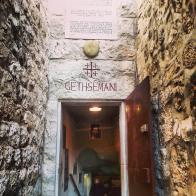 particular religion but I do believe in religion. I believe that some people need there to be something to look up to when they are lost and lonely and afraid. They need faith. That is what I believe. God, to me is a word that simply means hope and that for many, gives them the strength to get through the darkest of times.
particular religion but I do believe in religion. I believe that some people need there to be something to look up to when they are lost and lonely and afraid. They need faith. That is what I believe. God, to me is a word that simply means hope and that for many, gives them the strength to get through the darkest of times.
 particular religion but I do believe in religion. I believe that some people need there to be something to look up to when they are lost and lonely and afraid. They need faith. That is what I believe. God, to me is a word that simply means hope and that for many, gives them the strength to get through the darkest of times.
particular religion but I do believe in religion. I believe that some people need there to be something to look up to when they are lost and lonely and afraid. They need faith. That is what I believe. God, to me is a word that simply means hope and that for many, gives them the strength to get through the darkest of times.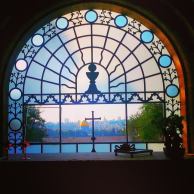 My grandma was the only one among my family to wholeheartedly follow a religion. Even as she grew ill she would have a priest visit as she lay in the lounge, confined to a hospital bed. I wasn’t even a teenager when she died and I’d never felt a particularly strong bond with her but when she passed away I felt more loss than I have for anyone. Something I can’t explain but have carried with me since. When I am sad or lonely, I speak to my grandma. This trip was to give back to her. She would have appreciated the landmarks and the history much more than I but I had the chance to go and I would could carry her with me as I went.
My grandma was the only one among my family to wholeheartedly follow a religion. Even as she grew ill she would have a priest visit as she lay in the lounge, confined to a hospital bed. I wasn’t even a teenager when she died and I’d never felt a particularly strong bond with her but when she passed away I felt more loss than I have for anyone. Something I can’t explain but have carried with me since. When I am sad or lonely, I speak to my grandma. This trip was to give back to her. She would have appreciated the landmarks and the history much more than I but I had the chance to go and I would could carry her with me as I went.
A short ride later, I took my first steps over the Mount of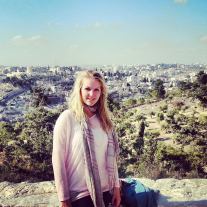 Olives, where Jesus is believed to have been crucified. As I looked for garden associated a voice called to me. A young Palestinian man asked if he could help me. At the time I didn’t realise that this young man would cause me to have faith in humanity again. We spent the day going to different sites, churches and view points. He offered me support climbing the rocky mountains, waited outside church grounds to give me space, and explained the wonders of Jerusalem. People greeted him everywhere we went and his friends helped us to get from place to place, one even let me ride his camel. He
Olives, where Jesus is believed to have been crucified. As I looked for garden associated a voice called to me. A young Palestinian man asked if he could help me. At the time I didn’t realise that this young man would cause me to have faith in humanity again. We spent the day going to different sites, churches and view points. He offered me support climbing the rocky mountains, waited outside church grounds to give me space, and explained the wonders of Jerusalem. People greeted him everywhere we went and his friends helped us to get from place to place, one even let me ride his camel. He 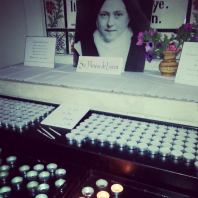 asked nothing for his kindness and even made time to remind me to protect my belongings.
asked nothing for his kindness and even made time to remind me to protect my belongings.
 Olives, where Jesus is believed to have been crucified. As I looked for garden associated a voice called to me. A young Palestinian man asked if he could help me. At the time I didn’t realise that this young man would cause me to have faith in humanity again. We spent the day going to different sites, churches and view points. He offered me support climbing the rocky mountains, waited outside church grounds to give me space, and explained the wonders of Jerusalem. People greeted him everywhere we went and his friends helped us to get from place to place, one even let me ride his camel. He
Olives, where Jesus is believed to have been crucified. As I looked for garden associated a voice called to me. A young Palestinian man asked if he could help me. At the time I didn’t realise that this young man would cause me to have faith in humanity again. We spent the day going to different sites, churches and view points. He offered me support climbing the rocky mountains, waited outside church grounds to give me space, and explained the wonders of Jerusalem. People greeted him everywhere we went and his friends helped us to get from place to place, one even let me ride his camel. He  asked nothing for his kindness and even made time to remind me to protect my belongings.
asked nothing for his kindness and even made time to remind me to protect my belongings.
So often are we judged by our age, colour, religion, sex ect and all the time we are warned against strangers and the dangers people pose. Everyone is after something right? Well today this man was nothing but gentle. He didn’t talk much but always offered information or guidance when required. At the end of the day I sat in his cousins coffee shop reading while he was downstairs in the sweet shop with his family. He then had me driven to the check point so I could return home. Today I put a little bit of faith in a man I just met and in doing so was humbled and inspired to be more, more selfless, more giving, more.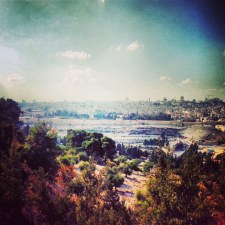

I would like to believe that he was something from my grandma, by believing in her and taking the time to step into her world, she was showing me what I could find. She sent me someone to protect and guide me so that I could open my heart up fully to all possibilities. Now don’t get me wrong. My beliefs haven’t changed. I’m not suddenly going to become religious but it’s a nice thought and I do believe some part of her was with me today, living through me and the gentle stranger I walked with.
Friday 14 November 2014
Clashes in Abu Dis
Clashes broke out yesterday evening between Palestinians and Israeli soldiers. They lasted around one hour, until the Palestinian demonstrators were dispersed with tear gas.
Demonstrations are extremely common in Palestine and occur as a response to the Israeli occupation in general, the Apartheid Wall or when Israel systematically targets and kills innocent civilians across the West Bank and Gaza.
Palestinians will usually start fires and throw stones - more of a symbolic form of resistance than an actual threat to soldiers that are armed to the teeth with some of the most advanced weaponry in the world.
When your human rights are violated on a daily basis and your freedom of movement is restricted inside your own country, let alone outside of it, then these kinds of clashes are seen as an opportunity for many Palestinians to feel as though their voice is being heard.
You may notice from the photos below just how young some of the demonstrators are - many of them I am teaching at Abu Dis Boys School and work with at the community centre. This is because they feel as though they have no opportunities in Palestine. Their studies are constantly disrupted by the occupation and Israeli violence and they feel as though these kinds of demonstrations will help to assist in the liberation of their land.
The kind of "illegitimate" resistance that can be seen in the following photos are used as a tool by the mainstream media to portray all Palestinians as "terrorists". Whether in Jerusalem or Abu Dis, a Palestinian with a keffiyeh wrapped around his face hurling stones is no threat to a soldier in the IDF, in full body armour and a helmet carrying the latest US-made heavy weaponry.
Demonstrations are extremely common in Palestine and occur as a response to the Israeli occupation in general, the Apartheid Wall or when Israel systematically targets and kills innocent civilians across the West Bank and Gaza.
Palestinians will usually start fires and throw stones - more of a symbolic form of resistance than an actual threat to soldiers that are armed to the teeth with some of the most advanced weaponry in the world.
When your human rights are violated on a daily basis and your freedom of movement is restricted inside your own country, let alone outside of it, then these kinds of clashes are seen as an opportunity for many Palestinians to feel as though their voice is being heard.
You may notice from the photos below just how young some of the demonstrators are - many of them I am teaching at Abu Dis Boys School and work with at the community centre. This is because they feel as though they have no opportunities in Palestine. Their studies are constantly disrupted by the occupation and Israeli violence and they feel as though these kinds of demonstrations will help to assist in the liberation of their land.
The kind of "illegitimate" resistance that can be seen in the following photos are used as a tool by the mainstream media to portray all Palestinians as "terrorists". Whether in Jerusalem or Abu Dis, a Palestinian with a keffiyeh wrapped around his face hurling stones is no threat to a soldier in the IDF, in full body armour and a helmet carrying the latest US-made heavy weaponry.

Tuesday 11 November 2014
They Came Marching!
I wrote a poem based on my time here and the things I have seen. The drawing marks the story that I have created and taken from images that have captured my interest.
They Came Marching!
Move, move, move for the forward march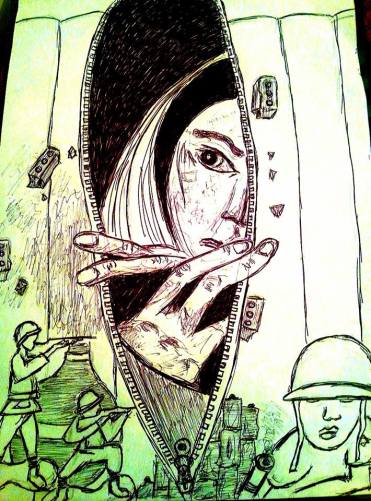 Their heavy, stomp-ant feet.
Left was I forgotten;
In a dungeon, dark and deep.
They’d sought refugee, hope, sanctuary
But recovered and pushed their elite.
Clash upon clash, do they fight for more
While homes come crumbling down.
Bye goes my lego house
The bricks of dust and soot of brown.
The fight is lost, we retreat for safety
Another house, another street, another town.
Up, up, up goes the concrete wall
The mark of us pushed aside.
We are divided
Too weak from those who’d died.
Toy soldier mark my stolen land
Just games that crush my pride.
Check, check, check do we wait our turn
Like sheep wanting to pass
Fighting has been made redundant
Against their guns, their ammo, their gas.
Step by every waiting step, I make it to the front
But no! I’m disregarded, rejected like an ass.
Green, blue, green, the mark of my identity.
It shows their force, their power, their mite.
My name, my family, my history
Was blown away in a matter of nights.
Where are you my listener?
Can you hear my calls, my needs, my plight?
I’m still waiting for an answer
Some hope, some faith, some fight…..
Their heavy, stomp-ant feet.
Left was I forgotten;
In a dungeon, dark and deep.
They’d sought refugee, hope, sanctuary
But recovered and pushed their elite.
Clash upon clash, do they fight for more
While homes come crumbling down.
Bye goes my lego house
The bricks of dust and soot of brown.
The fight is lost, we retreat for safety
Another house, another street, another town.
Up, up, up goes the concrete wall
The mark of us pushed aside.
We are divided
Too weak from those who’d died.
Toy soldier mark my stolen land
Just games that crush my pride.
Check, check, check do we wait our turn
Like sheep wanting to pass
Fighting has been made redundant
Against their guns, their ammo, their gas.
Step by every waiting step, I make it to the front
But no! I’m disregarded, rejected like an ass.
Green, blue, green, the mark of my identity.
It shows their force, their power, their mite.
My name, my family, my history
Was blown away in a matter of nights.
Where are you my listener?
Can you hear my calls, my needs, my plight?
I’m still waiting for an answer
Some hope, some faith, some fight…..
Hunger Strikes Against Adminitrative Detention
Hunger strike is a common means of protest against Israel’s use of
‘administrative detention’ – a process through which prisoners are held
indefinitely, without charge or trial. Many detainees resist this
process by refusing food, living only on water and salt. On the 24th of
April this year a mass hunger strike
took place, initiated by 120 people arrested and detained without
charge. A young Israeli man who refused to serve in the IDF (Israeli
Defence Forces) has been imprisoned for the fifth time. He too is striking against the oppressive regime by refusing to eat.
Imprisonment without trial is commonplace here and almost everyone I have spoken to has been affected by it in some way. On Monday, a woman I give English conversation classes to, told me that her son’s prison detention has been extended. He was arrested 3 months ago, without charge or trial, and was due to be released on Wednesday. She will now have to wait another 3 months before he comes home. The most worrying thing for her is that her son has a severe skin condition and is on prescription medication. In prison he is denied this medicine and is in increasing pain. This is also not the first time he has been in prison. In 2010, when he was 17, he was behind bars for 24 months. She is clearly a strong women, but reveals to us that she feels desperately worried that when she smiles, people forget the pain she is carrying. Another lady, Nisreen, then added that her friend’s 16 year old son was taken away at 3am a few days ago. Nisreen has a 20 year old son of her own and said that, every night, she lies awake until the early hours of the morning, worrying that the army might break in and take him away.
We had a discussion at the university that afternoon about administrative detention. A lecturer of Law informed us that in the last academic year, 60 students have been arrested. He reported that 3 of these were via ‘flying check-points’ at the university entrance – check points that are enforced at anytime, anywhere. He also said that 2000 tear gas canisters were used in attacks on the university in 1 year. A student in the group shared that her brother was arrested from her home 4 years ago, without charge or trial, and died from neglect whilst in solitary confinement. The court case in ongoing.
Since Monday, 4 men in Abu Dis have been arrested for ‘administrative detention’, from their beds in the early hours of the morning. One of these men is the Deputy Mayor of Abu Dis who was arrested on the morning that he was due to become Mayor. The details of these arrests are kept in the Israeli government’s ‘secret file’. Neither detainees nor lawyers can see this file, leaving them uninformed and helpless. Records now show that 40% of all Palestinian men have been imprisoned since 1967. This figure is only of those who remain there for over 1 month, anything less goes unrecorded.
Many people here join prisoners in solidarity by going on hunger strike with them. I have just made it through a 3 day strike to show solidarity, raise awareness and also to raise money for the Camden Abu Dis Friendship Association. I had nothing but water for over 72 hours. It was a struggle, but this short strike has given me great insight into the determination and desperation of many who have sustained it for weeks and months on end.
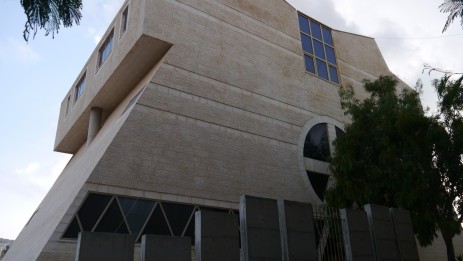
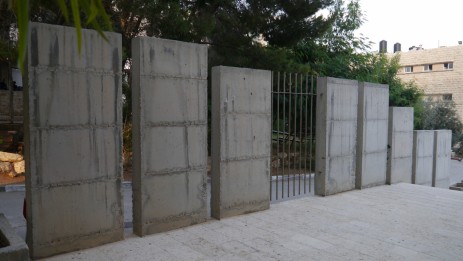
Imprisonment without trial is commonplace here and almost everyone I have spoken to has been affected by it in some way. On Monday, a woman I give English conversation classes to, told me that her son’s prison detention has been extended. He was arrested 3 months ago, without charge or trial, and was due to be released on Wednesday. She will now have to wait another 3 months before he comes home. The most worrying thing for her is that her son has a severe skin condition and is on prescription medication. In prison he is denied this medicine and is in increasing pain. This is also not the first time he has been in prison. In 2010, when he was 17, he was behind bars for 24 months. She is clearly a strong women, but reveals to us that she feels desperately worried that when she smiles, people forget the pain she is carrying. Another lady, Nisreen, then added that her friend’s 16 year old son was taken away at 3am a few days ago. Nisreen has a 20 year old son of her own and said that, every night, she lies awake until the early hours of the morning, worrying that the army might break in and take him away.
We had a discussion at the university that afternoon about administrative detention. A lecturer of Law informed us that in the last academic year, 60 students have been arrested. He reported that 3 of these were via ‘flying check-points’ at the university entrance – check points that are enforced at anytime, anywhere. He also said that 2000 tear gas canisters were used in attacks on the university in 1 year. A student in the group shared that her brother was arrested from her home 4 years ago, without charge or trial, and died from neglect whilst in solitary confinement. The court case in ongoing.
Since Monday, 4 men in Abu Dis have been arrested for ‘administrative detention’, from their beds in the early hours of the morning. One of these men is the Deputy Mayor of Abu Dis who was arrested on the morning that he was due to become Mayor. The details of these arrests are kept in the Israeli government’s ‘secret file’. Neither detainees nor lawyers can see this file, leaving them uninformed and helpless. Records now show that 40% of all Palestinian men have been imprisoned since 1967. This figure is only of those who remain there for over 1 month, anything less goes unrecorded.
Many people here join prisoners in solidarity by going on hunger strike with them. I have just made it through a 3 day strike to show solidarity, raise awareness and also to raise money for the Camden Abu Dis Friendship Association. I had nothing but water for over 72 hours. It was a struggle, but this short strike has given me great insight into the determination and desperation of many who have sustained it for weeks and months on end.
The Prisoners Museum on the Al-Quds University campus


Friday 7 November 2014
Taking Strength From Innocence
In Palestine, coffee shops are places of relaxation and a chance for people to unwind and escape the day-to-day troubles of occupation. Upon entrance in the majority of coffee shops in Palestine, you will be greeted with swirls of shisha smoke and the sights of friends playing card games or watching football. But on the night of 23rd July of this year, the Jaffa coffee shop in Abu Dis, was a scene far from relaxation and enjoyment.
In July, Israel began a campaign of relentless bombing and destruction in Gaza, where the lives of over 2000 Palestinians were taken - in an assault termed Operation Protective Edge. In solidarity with the people of Gaza and also as a sign of resistance to Israel’s brutal attack, the residents of Abu Dis had organised daily demonstrations across the village. Stone throwing amongst the Palestinians was common during these protests and they were often countered by Israeli heavy weaponry, tear gas and gun fire.
29 year-old Fuad Al-Hushiea was going about his normal business, managing Jaffa and serving customers, when these demonstrations broke out a street away from his coffee shop. As a sign of precaution and also to protect the wellbeing of his customers from the burning affects of tear gas, Fuad shut one of the doors of his shop and left the other one open. As the protests got more intense, Jaffa was suddenly bombarded by four armed Israeli soldiers who stormed to the back of the shop and arrested Fuad and two of his customers - Abed and Mohanad, who is married with two children. Fuad, flooded with a state of confusion, was accused by the soldiers of throwing stones. The soldiers provided no evidence and Fuad adamantly denied any involvement in the demonstrations - he was merely working. Despite his insistence, Fuad was threatened by the guns of heartless Israeli soldiers and was forcefully searched before being taken to a nearby Israeli military camp in Abu Dis.
Once inside the camp, Fuad was handcuffed, his face was covered and he was put beside a wall and left to be beaten. His mobile phone was cut, meaning his friends and family were unaware of his whereabouts, (and later found out that he was arrested via Facebook) and he was continually beaten for two and a half hours. As if this wasn’t enough of a punishment for an innocent coffee shop owner, Fuad was driven to a police station in the nearby illegal Israeli settlement of Ma’ale Adumim and was further interrogated. Soldiers offered to release Fuad on the condition that he worked as a spy for them - a widespread method of Israeli intimidation across Abu Dis that is used on many young Palestinians. Of course, Fuad declined the offer. The Israelis then took his fingerprints and photographed him, despite his refutations: “I’m the owner of the coffee shop! Smell my hands, it’s coffee.”
 |
| Fuad Al-Hushiea was managing his coffee shop when he was arrested for "throwing stones". |
Fuad left the police station at 8am, nine hours after his arrest, and was taken to Ofer Prison near Ramallah. Given that there was no evidence presented to depict that Fuad was guilty, his prison sentence of three months was an absurd act of systemic injustice. After serving two months at Ofer, he was transferred to al-Naqab Prison in the Negev desert - which has been described as having conditions like the notorious Abu Ghraib prison.
Fuad went to a military court nine times, where his voice of supposed “guilt” was contested amongst the voices of “honest” Israeli soldiers. So after serving his full sentence, he was then forced to pay 3000 shekels (around £600) to be released, money that he borrowed from his brother.
It’s inevitable that three months in prison would have a hugely detrimental effect on any young man. But in the case of Fuad, this was coupled with a complete state of disarray for a peaceful man who is still entirely insistent on his innocence. His brother left his work in a supermarket to manage the coffee shop, while Fuad psychologically perished in prison. Alongside managing Jaffa, Fuad studies English Literature at Al Quds University and his studies were therefore greatly affected.
 |
| The Jaffa coffee shop in Abu Dis. |
Having been released only recently, on the 28th October, Fuad is still asking why he was imprisoned - “How can I live like this?” he asked me. Demonstrations and clashes between Palestinians and Israeli soldiers in Abu Dis are still occurring on an almost daily basis and whenever they break out Fuad closes his coffee shop and goes home. Understandably he doesn’t want to face the risks of more time in prison and this single act of injustice will stay with him, probably for the rest of his life.
I asked Fuad if his time in prison made him any stronger. Smiling, he replied: “We Palestinians are always strong.” I suppose you have to always be strong to be innocently imprisoned without any reason. Or to live under a crippling occupation, where your human rights are violated on a daily basis. This strength is something that we can all draw on for inspiration in our own lives. Which, in contrast to those of Palestinians, are lives of luxury.
I asked Fuad if his time in prison made him any stronger. Smiling, he replied: “We Palestinians are always strong.” I suppose you have to always be strong to be innocently imprisoned without any reason. Or to live under a crippling occupation, where your human rights are violated on a daily basis. This strength is something that we can all draw on for inspiration in our own lives. Which, in contrast to those of Palestinians, are lives of luxury.
"We tried peace in the Oslo Accords. We tried fighting during the Intifadas. Neither worked, so now maybe it's time for God to fix our problems." - Fuad Al-Hushiea.
Tuesday 4 November 2014
Shuafat Medical Clinic.
This weekend I took the opportunity to visit Shuafat refugee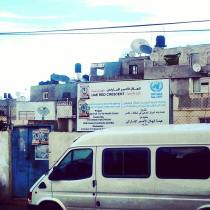 camp, more specifically to the health clinic there. I was in contact with a lady who was a diabetic specialist nurse and worked at the clinic. She showed me around and allowed me to sit in with patients. The clinic had a midwife, phlebotomist, diabetes clinic, pharmacist, bloods lab, and several doctors. It was in many respects a large GP practice. The clinic had been built to treat patience who had sought refuge here after WW2 and the Israeli take-over.
camp, more specifically to the health clinic there. I was in contact with a lady who was a diabetic specialist nurse and worked at the clinic. She showed me around and allowed me to sit in with patients. The clinic had a midwife, phlebotomist, diabetes clinic, pharmacist, bloods lab, and several doctors. It was in many respects a large GP practice. The clinic had been built to treat patience who had sought refuge here after WW2 and the Israeli take-over.
 camp, more specifically to the health clinic there. I was in contact with a lady who was a diabetic specialist nurse and worked at the clinic. She showed me around and allowed me to sit in with patients. The clinic had a midwife, phlebotomist, diabetes clinic, pharmacist, bloods lab, and several doctors. It was in many respects a large GP practice. The clinic had been built to treat patience who had sought refuge here after WW2 and the Israeli take-over.
camp, more specifically to the health clinic there. I was in contact with a lady who was a diabetic specialist nurse and worked at the clinic. She showed me around and allowed me to sit in with patients. The clinic had a midwife, phlebotomist, diabetes clinic, pharmacist, bloods lab, and several doctors. It was in many respects a large GP practice. The clinic had been built to treat patience who had sought refuge here after WW2 and the Israeli take-over.
The refugee camp was associated with three regions and in 1947 it received special and separate treatment from the rest of Palestine and was placed under effective United Nations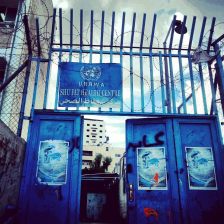 control. Supported by the Red Cross, many people found safety in its walls but in 1964 refugees from the Muaska Jerusalem camp were forced to relocate to Shuafat. It took away their access to the holy city and their livelihood. Shaufat is now an overcrowded place with a server lack of resources, trying to accommodate for the people from the 48 locations that were taken by Israelis.
control. Supported by the Red Cross, many people found safety in its walls but in 1964 refugees from the Muaska Jerusalem camp were forced to relocate to Shuafat. It took away their access to the holy city and their livelihood. Shaufat is now an overcrowded place with a server lack of resources, trying to accommodate for the people from the 48 locations that were taken by Israelis.
 control. Supported by the Red Cross, many people found safety in its walls but in 1964 refugees from the Muaska Jerusalem camp were forced to relocate to Shuafat. It took away their access to the holy city and their livelihood. Shaufat is now an overcrowded place with a server lack of resources, trying to accommodate for the people from the 48 locations that were taken by Israelis.
control. Supported by the Red Cross, many people found safety in its walls but in 1964 refugees from the Muaska Jerusalem camp were forced to relocate to Shuafat. It took away their access to the holy city and their livelihood. Shaufat is now an overcrowded place with a server lack of resources, trying to accommodate for the people from the 48 locations that were taken by Israelis.
The practice worked on a walk-in basis, no bookings needed. It worked well but made the mornings very busy while the place look dormant in the afternoons. As always, funds were lacking so their medical equipment was old and over-used. Although some old methods are still used worldwide today, they often aren’t as reliable. Things we take for granted in the NHS, is the amount we waste. At home we with chuck things willy-nilly for ‘hygiene’ purposes, which is right however its a luxury and one that is abused. The clinic 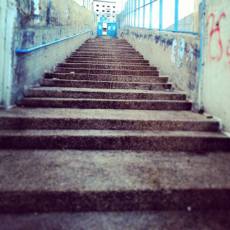 didn’t have nearly enough resources and it all relied on things being cleaned properly. This trip demonstrated the different challenges for the wonderful, hardworking nurses there and the ones I see nurses face back home .
didn’t have nearly enough resources and it all relied on things being cleaned properly. This trip demonstrated the different challenges for the wonderful, hardworking nurses there and the ones I see nurses face back home .
 didn’t have nearly enough resources and it all relied on things being cleaned properly. This trip demonstrated the different challenges for the wonderful, hardworking nurses there and the ones I see nurses face back home .
didn’t have nearly enough resources and it all relied on things being cleaned properly. This trip demonstrated the different challenges for the wonderful, hardworking nurses there and the ones I see nurses face back home .
Probably the most challenging thing they faced was it’s temporary relocation. As they’re old building had been bulldozed, waiting on the two year project to rebuild, the center was based on the fist floor of the UN school, located high at the top of a steep staircase. Not practical and showed in their quiet building. The country wasn’t equipped to deal with the disabled or elderly. Thankfully the close family community meant that elderly had a lot of support, even if it wasn’t medical. No, the people with disabilities faced the hardest challenges here with nowhere accommodating for any physical challenges and I scarcely have heard one word about anyone with learning disability.
I am baffled as to where these people are. Just because I have hardly seen anyone obviously recognizably disabled, it certainly doesn’t mean that Arabs have a smaller percentage of vulnerable people. My fear is that the land is so demanding that they rarely venture out or even worse , they don’t feel 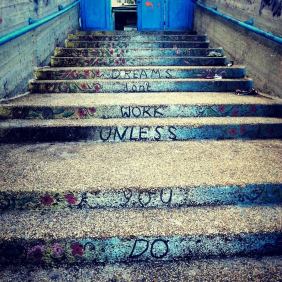 connected because of social isolation. This is all speculation but some of the small research I’ve done indicates both as factors. Their lives are a constant battle.
connected because of social isolation. This is all speculation but some of the small research I’ve done indicates both as factors. Their lives are a constant battle.
 connected because of social isolation. This is all speculation but some of the small research I’ve done indicates both as factors. Their lives are a constant battle.
connected because of social isolation. This is all speculation but some of the small research I’ve done indicates both as factors. Their lives are a constant battle.
Unfortunately here in Palestine I haven’t come across any community nursing. Anything that isn’t done in a center is completed by family. Not ideal and far from what you’d hope for people living in such difficult conditions. As for the clinic I can say everyone was lovely, certainly people I would trust with my health.
Saturday 1 November 2014
A Bullet for a Stone
Tensions are rising in Jerusalem as Israel continues to restrict Muslims
from using Al’Aqsa Mosque. This has angered Palestinians across the
West Bank and demonstrations are becoming more frequent.
When leaving work last week, I stepped into the dark winter evening to see figures gathering, followed by a white cloud. They were returning from a demonstration, faces covered, taking a new position to wait and watch. In the distance army vehicles drove away, along the separation wall from where the protest had begun. No one knew whether the army was actually leaving, or if they were planning an ambush, to arrest the boys as if criminals. By then the white cloud had reached me. Chilli-like tear gas filled my nose and throat and in an instant my eyes were streaming. Suddenly, I was a part of it. The teenagers around me, rehearsed in this event, quickly presented tissues and raw, cut onion. Deep breaths over the flesh of an onion serves as an effective antidote to the chemical irritant. Next, a school boy started a fire, explaining that smoke will fight the gas. One protester was gripping a catapult, while another was hanging back, watching. The boy further back was balancing on crutches, the bullet wound in his leg a reminder of what could happen. At the front of the crowd a figure whose identity was concealed by a heavy gas mask, stood armed with a camera, ready to shoot. When nothing further happened, they concluded that this time the soldiers really had left.
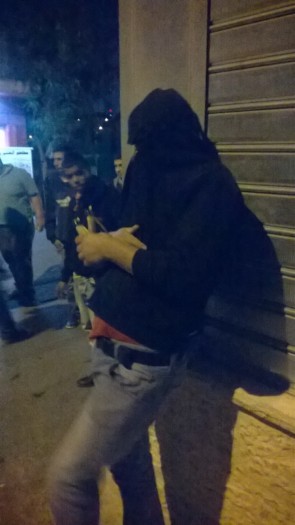
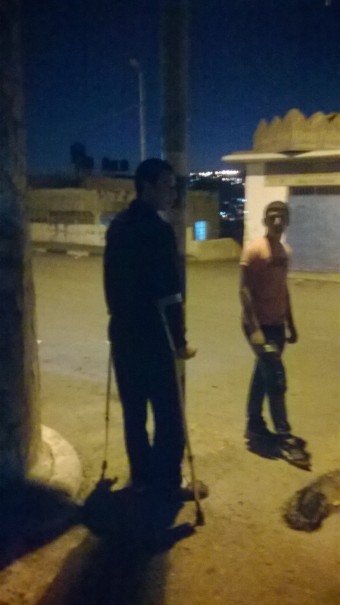
Outside of Abu Dis, demonstrations have ended differently. A few days ago a 14 year old boy was shot dead
outside Ramallah – a live bullet to the head. An Israeli solider took
life in response to a child throwing stones. This echoed the death of 13
year old Bahaa Samir Badir, only a week before.
Most people reading this are probably aware of the awful incident that recently happened in Jerusalem. A Palestinian man drove his car into a crowd, killing a baby. The story hit the headlines across the UK, deeming the man a terrorist. The Israeli police shot him to death at the scene.
What did not reach British Media, was that a few days before, an Israeli settler in Ramallah drove his car into 2 Palestinian children, killing a 5 year old girl and badly injuring another. The police have turned a blind eye to this incident and the Isreali driver has not been identified.
The family of the man shot dead by the police in Jerusalem has been denied the right to a funeral. Israel possesses his body and has set conditions for it’s burial: 1) it must take place in the middle of the night, 2) the body must go straight to the grave, 3) only 20 people can be present. If these conditions are not met, the body will go to the ‘numbers graveyard’ and be anonymous. On Sunday, his loved ones gathered on the outskirts of Jerusalem to mark the end of his life. A close eye was kept on this event. On the news I saw them surrounded by soldiers and security lights, and out of the window, heard helicopters overhead.
The above incidents have fueled Palestinian resistance. These are people who continue to have their cultural and religious identities squashed and whose children are being killed. They are people who, when responding to violence with violence, are labeled terrorists.
When leaving work last week, I stepped into the dark winter evening to see figures gathering, followed by a white cloud. They were returning from a demonstration, faces covered, taking a new position to wait and watch. In the distance army vehicles drove away, along the separation wall from where the protest had begun. No one knew whether the army was actually leaving, or if they were planning an ambush, to arrest the boys as if criminals. By then the white cloud had reached me. Chilli-like tear gas filled my nose and throat and in an instant my eyes were streaming. Suddenly, I was a part of it. The teenagers around me, rehearsed in this event, quickly presented tissues and raw, cut onion. Deep breaths over the flesh of an onion serves as an effective antidote to the chemical irritant. Next, a school boy started a fire, explaining that smoke will fight the gas. One protester was gripping a catapult, while another was hanging back, watching. The boy further back was balancing on crutches, the bullet wound in his leg a reminder of what could happen. At the front of the crowd a figure whose identity was concealed by a heavy gas mask, stood armed with a camera, ready to shoot. When nothing further happened, they concluded that this time the soldiers really had left.


But the soldiers would be back. At 1am yesterday, two brothers were
arrested from their home. One of them, aged 20, was shot in the head
with a rubber bullet when throwing stones last month. Those who helped
him were shot in the process, but eventually managed to get him to a
hospital. He had made a recovery and returned home. Then yesterday
morning, he and his brother were taken from their beds and locked away
for ”security reasons”. A spy balloon has now appeared in the sky. The
floating camera is a visual reminder that here in the big prison,
nothing goes unseen.
Most people reading this are probably aware of the awful incident that recently happened in Jerusalem. A Palestinian man drove his car into a crowd, killing a baby. The story hit the headlines across the UK, deeming the man a terrorist. The Israeli police shot him to death at the scene.
What did not reach British Media, was that a few days before, an Israeli settler in Ramallah drove his car into 2 Palestinian children, killing a 5 year old girl and badly injuring another. The police have turned a blind eye to this incident and the Isreali driver has not been identified.
The family of the man shot dead by the police in Jerusalem has been denied the right to a funeral. Israel possesses his body and has set conditions for it’s burial: 1) it must take place in the middle of the night, 2) the body must go straight to the grave, 3) only 20 people can be present. If these conditions are not met, the body will go to the ‘numbers graveyard’ and be anonymous. On Sunday, his loved ones gathered on the outskirts of Jerusalem to mark the end of his life. A close eye was kept on this event. On the news I saw them surrounded by soldiers and security lights, and out of the window, heard helicopters overhead.
The above incidents have fueled Palestinian resistance. These are people who continue to have their cultural and religious identities squashed and whose children are being killed. They are people who, when responding to violence with violence, are labeled terrorists.
Thursday 23 October 2014
Abu Shamsiya Family
The city of Hebron is continuously subjected to the most ruthless forms of Israeli occupation and settler violence and its residents are often arrested, without charge, as a form of intimidation and oppression. I travelled to the H2 area of Hebron (under full Israeli military control) and met with the Abu Shamsiya family, who are frequently victims of persecution from settlers and the occupation forces.
Emad Abu Shamsiya lives with his wife and five children in the H2 area, embedded amongst swathes of illegal Israeli settlers. He took us through the checkpoint he has to pass through everyday, when he walks to and from his house. This checkpoint is sometimes shut and soldiers prevent him from passing through, meaning he has to walk many more kilometres round to the other entrance. We passed through the checkpoint and stood facing Al-Shuhada Street, once a vibrant marketplace within Hebron, but now it is often termed a ghost town where all of the Palestinian shops have been closed. It is controlled by Israeli occupation forces who stand less than a quarter of the way up the road and refuse entry to Palestinians - a policy of separation that couldn’t be more explicit.
Emad Abu Shamsiya lives with his wife and five children in the H2 area, embedded amongst swathes of illegal Israeli settlers. He took us through the checkpoint he has to pass through everyday, when he walks to and from his house. This checkpoint is sometimes shut and soldiers prevent him from passing through, meaning he has to walk many more kilometres round to the other entrance. We passed through the checkpoint and stood facing Al-Shuhada Street, once a vibrant marketplace within Hebron, but now it is often termed a ghost town where all of the Palestinian shops have been closed. It is controlled by Israeli occupation forces who stand less than a quarter of the way up the road and refuse entry to Palestinians - a policy of separation that couldn’t be more explicit.
 |
| Israeli checkpoint. |
Emad took us to his house, less than one hundred metres from Al-Shuhada Street. As we were walking, I noticed he walked with a limp in his right leg. He had been shot six times in the leg and his arms during the First Intifada - whilst harmlessly walking the streets with his friends. Experiences of Israeli violence aren’t rare for Emad. Dealing with this day-to-day oppression is an ongoing struggle and you can see that his experiences have meant that a sense of fearlessness runs through his veins.
 |
| Al-Shuhada Street; a ghost town. |
 |
| Emad Abu Shamsiya. |
As we approached his house, we walked through a small gap in a concrete wall - built by the Israelis. This was the entrance to his house. We continued through a metal fence that surrounds his house, built by Emad himself to prevent settlers from throwing stones and rubbish at his home and his family. On the roof of his home stands an Israeli military watchtower - which is used on Fridays and Saturdays to control and monitor clashes, whilst Emad and his family would sit inside.
He invited us in to his home, a modest, concrete shack, where water and electricity is limited and is cut off whenever the occupation forces fancy. Of course, as is customary in Palestine, we were offered coffee and as we drank, Emad’s children began to return home from school.
The Abu Shamsiya family, and Emad in particular, are regularly victims of arrest by Israeli forces - the most recent incident occurred on 4th October, when the whole family was arrested. There was no reason given for the arrest and Emad believes that it is just a form of intimidation that is used to eventually force the family to leave their home. There have been countless attempts by Israeli settlers to force their displacement, either through violence and humiliation (throwing stones and urinating on the family’s house) or by paying the family large sums of money to leave. But the Abu Shamsiya family are standing defiant. They know that the Israeli occupation and the settlers have no right to be on their land and they will continue to resist until their freedom is achieved.
He invited us in to his home, a modest, concrete shack, where water and electricity is limited and is cut off whenever the occupation forces fancy. Of course, as is customary in Palestine, we were offered coffee and as we drank, Emad’s children began to return home from school.
The Abu Shamsiya family, and Emad in particular, are regularly victims of arrest by Israeli forces - the most recent incident occurred on 4th October, when the whole family was arrested. There was no reason given for the arrest and Emad believes that it is just a form of intimidation that is used to eventually force the family to leave their home. There have been countless attempts by Israeli settlers to force their displacement, either through violence and humiliation (throwing stones and urinating on the family’s house) or by paying the family large sums of money to leave. But the Abu Shamsiya family are standing defiant. They know that the Israeli occupation and the settlers have no right to be on their land and they will continue to resist until their freedom is achieved.
 |
| Entrance to the Abu Shamsiya family home. |
 |
| Fence surrounding the home. |
 |
| Israeli military watchtower on the roof of the house. |
Once arrested, the family were detained and intensely interrogated. sixteen-year-old Madleen, Emad’s daughter, was questioned for four hours and eventually released without charge. The situation was much worse for Emad and his son Awni, fifteen, who were imprisoned for two days and had to pay 1000 shekels, over a month’s wage for many Palestinians, - which they raised from family, friends and also the International Solidarity Movement (ISM) - to be released. Amongst the already harsh prison conditions, Awni was fed just one meal during the two days he was imprisoned.
 |
| 15-year-old Awni Abu Shamsiya. |
Despite only being a young child, Awni is used to this kind of mistreatment. He has been imprisoned on numerous occasions and has experienced violence from Israeli settlers and occupation forces. Some of these arrests have been because of alleged stone throwing, a widespread form of youth resistance in Palestine. But stones are thrown at heavily armed soldiers, who are occupying these children’s land. When a child feels as though they have no opportunities and no freedom in a militarily controlled society, violence becomes their voice, and this is understandable.
In Hebron, the number of arrests, particularly child arrests, has surged recently and the Abu Shamsiya family is just one amongst approximately one hundred and fifty other families living in this zone of Israeli imposed turmoil. It was difficult for me to remain hopeful whilst hearing the stories of Emad and his family. But whilst the stories were filled with misery, the family were filled with compassion and courage. These are two of the main human characteristics that can be used to overcome the inhumane Israeli occupation, and they are embedded within the hearts of so many Palestinians.
In Hebron, the number of arrests, particularly child arrests, has surged recently and the Abu Shamsiya family is just one amongst approximately one hundred and fifty other families living in this zone of Israeli imposed turmoil. It was difficult for me to remain hopeful whilst hearing the stories of Emad and his family. But whilst the stories were filled with misery, the family were filled with compassion and courage. These are two of the main human characteristics that can be used to overcome the inhumane Israeli occupation, and they are embedded within the hearts of so many Palestinians.
Subscribe to:
Posts (Atom)

